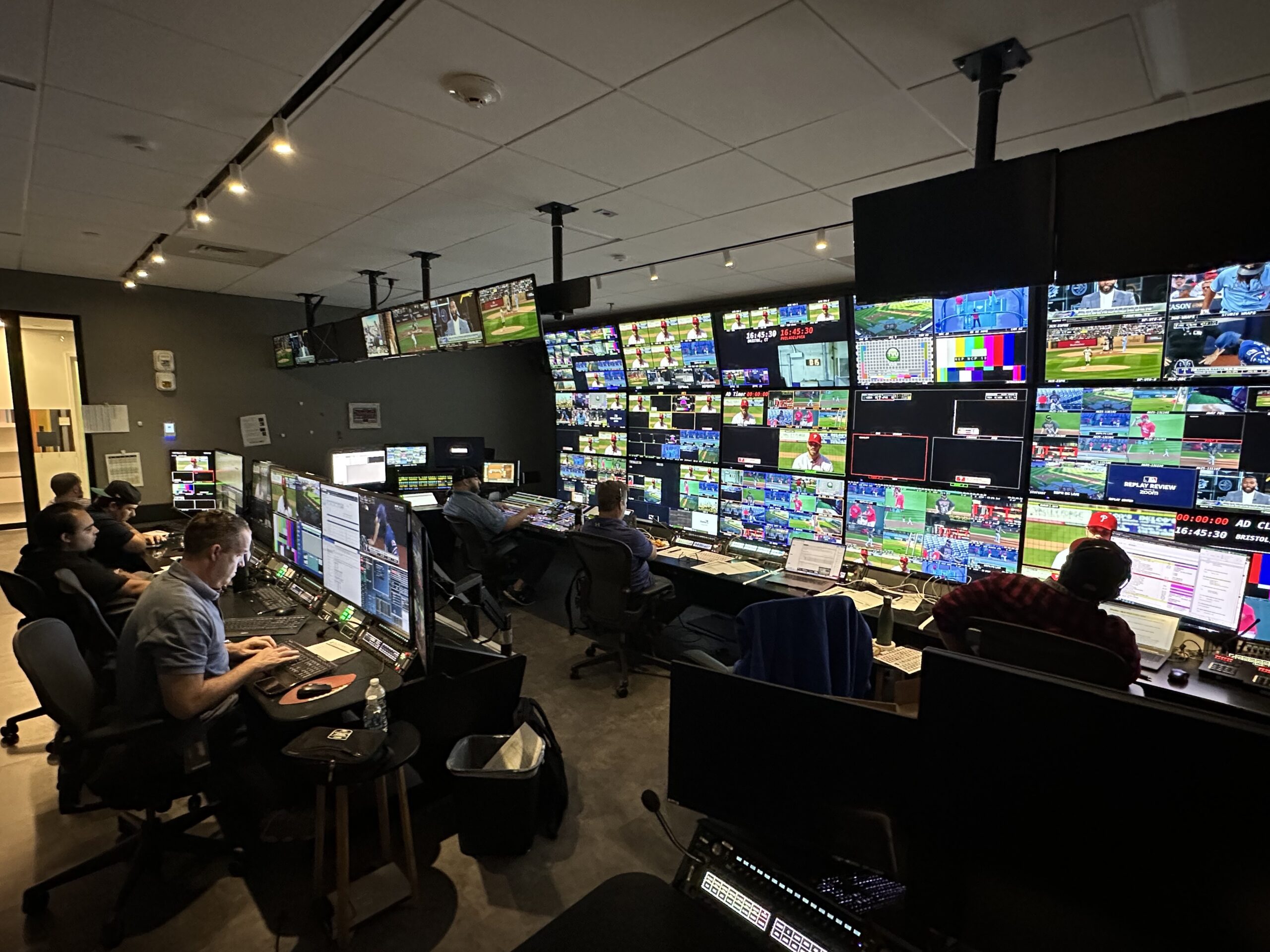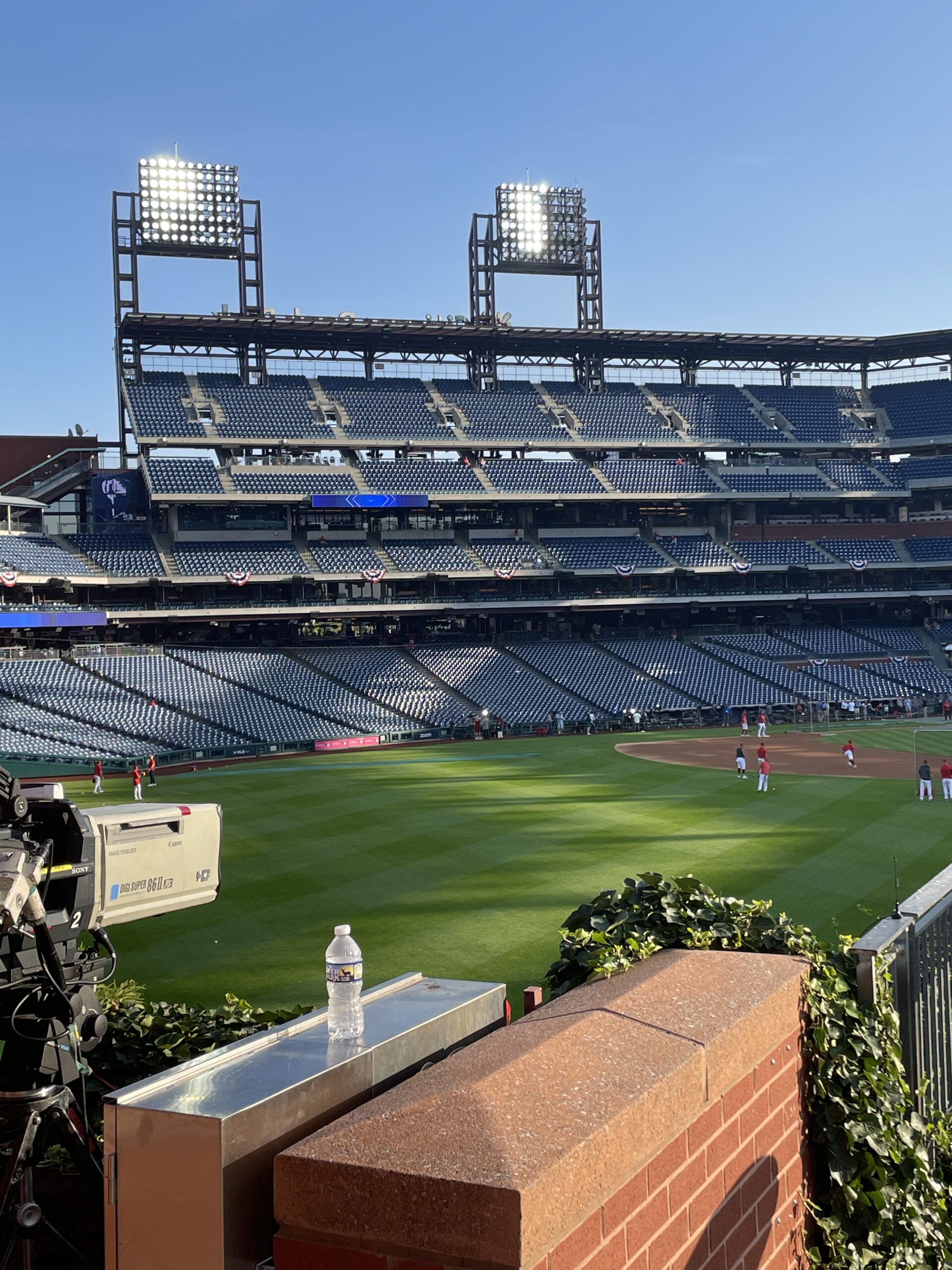MLB Postseason 2023: In Wild Card Frenzy, ESPN Produces Simultaneous Starts in Four Cities
Marlins–Phillies matchup is handled remotely with front bench in Bristol, CT
Story Highlights
Heading into today’s Game 2 of the three-game MLB Wild Card round, ESPN’s first day and night on the series was frenetic and fast-paced. Given Major League Baseball’s decision to schedule four games within a five-hour span, the broadcaster deployed a mix of onsite productions and REMI shows in four cities in two time zones.
“Logistically, we have great partners in NEP and have spent a lot of time preparing,” says Kevin Cleary, remote operations specialist, ESPN. “We took the time to make sure that all of our different crews, whether they’re full onsite productions or REMI productions, have all the equipment they need.”
Logistical Dance: Last-Minute Seedings Pose Geographic Challenges
Prior to the hectic start on Tuesday afternoon, it was wait-and-see for ESPN’s production and operations teams until the lineup of eight Wild Card seeds was finalized in the final week of the regular season. Some were set in advance: the Philadelphia Phillies’ No. 4 seed locked up the top Wild Card spot on Sept. 26, and the Atlanta Braves’ No. 1 seed secured the bye with the league’s best record on Sept. 27. Others took a bit more time: the Arizona Diamondbacks and Toronto Blue Jays clinched the No. 6 seeds in their respective leagues on Sept. 30; the Houston Astros’ No. 2 seed clinched the AL West on the final day of the season, Oct. 1. Although the ESPN team knew that four cities would host games, it did not know where the mobile units would be going.
“We had trucks on their way to certain locations,” says Cleary. “At the last minute, we actually had a production change: we went from having one production team working on a game to a different production team working on it. One of the bigger challenges is [the crew’s having to learn] different camera numbers and names of machines since we had to swap them out.”
After a full season of Sunday Night Baseball, when ESPN’s top MLB showcase deployed the same production model for 26 weekly games, the team had to adjust its approach for four simultaneous games. To allow for various scenarios, the crew opted for a mixture of full onsite shows — at Tampa Bay’s Tropicana Field and Minnesota’s Target Field — and two REMI productions from Bristol, CT — at Philadelphia’s Citizens Bank Park and Milwaukee’s American Family Field.
“This 30-path REMI in Philadelphia was built on Monday,” says Cleary. “We’re also building this out of a truck that doesn’t traditionally do baseball, so it was a pretty big lift.”
While Cleary and his staff handle operations in Philadelphia, production personnel like Director Mike Griffin, Producer Andy Jacobson, Technical Director Tim Kosko, and A1s Brian Shannon and Brian Deardorf are at the front bench in Bristol.
Thinking Geographically: NEP Group Provides Mobile Units for Multi-City Operations
In deploying two methods of production, ESPN relies on its partnership with NEP Group. Working closely with Cleary and his operations team, which includes Senior Operations Producers Mike Miner and Chip Sego and Operations Coordinator Stephanie Santora, the mobile-unit provider was ready to deploy its resources for any city.
“With the fight for the AL East between Baltimore and Tampa going down to the wire,” says Michael Pean, director, sales, NEP Group, “we knew we were going to be at one of those two locations. We had a truck assigned for either venue. If it came down to Sunday night, we were going to stage them between the cities, wait for the outcome of the game, and then head to the right location. Communication and planning are important: you have to think of the craziest scenario that could happen.”
For this Wild Card round, ESPN’s four mobile units are deployed as follows: the customary SNB truck, NCP11, in Milwaukee; NCP10 in Philadelphia; EN2 in Minnesota; and NCP7 in Tampa Bay. Geographically, Pean and his crew were able to assemble trucks that made the most sense based on their previous assignments. NCP11 traveled from Los Angeles after the final SNB game between the Dodgers and San Francisco Giants on Sept. 24. EN2 was in Cincinnati for Monday Night Football on Sept. 25. NCP10 drove over from Subaru Park in nearby Chester, PA, after handling the MLS’s Philadelphia Union vs. FC Dallas on Sept. 27. NCP7 had to drive to Tampa Bay from the Northeast.
“Ironically,” says Cleary, “we have a list that is more cities that we’re not going to. As the regular season whittled down to its final days, we would cross one off.”
From NEP’s perspective, sending appropriate mobile units to the sites is complicated by the congested sports calendar. At the conclusion of the Wild Card round, the trucks will head to new sites: NCP7 to UFC Apex for fights on Oct. 7 in Las Vegas, NCP10 to Tampa for the 2023 NHL on ESPN season opener on Oct. 10 at Amalie Arena, EN2 to another location for NHL on ESPN’s tripleheader on Oct. 10 and an NBA on ESPN tipoff game the following week, and NCP11 to help Fox Sports with the ALDS, ALCS, and World Series productions. In addition to NFL broadcasts and this month’s start of the NBA season, the toughest task is to not get lost in the broadcasting shuffle.
“On the baseball side,” adds Pean, “we first identified the trucks that we’re going to protect for each series. We reviewed each scenario and made the call as the Wild Card got closer, making sure to allow enough time to travel between cities.”
Tech Highlights: UmpCam, Shallow–Depth-of-Field Top Camera Complement
Technologically, each series taps into a wealth of cameras and equipment at each venue. In the lower bowl, games will deploy six super-slow-motion cameras for enhanced replays of big plays. Closer to the field, the productions are using technologies like UmpCam (except for Rangers–Rays in Tampa) and a shallow–depth-of-field camera. Editorially, the games will put the right people in the right place at the right time to immerse fans into the action.
“After big moments,” says Jacobson, “we’re positioning our reporters to do a quick interview with the player who made a positive impact. We’re here to document every pitch to the best of our ability, so that’s certainly our focus.”
UmpCam has been seen on other baseball properties at ESPN — besides the 2023 regular season, the MLB Little League World Series Classic and the College World Series — but it’s the first time it’s being used in the postseason. Developed by RF Wireless, the POV camera angle has given fans an inside look at what it’s like trying to hit a baseball at the professional level.
The UmpCam is one of a handful of production elements deployed for the regular season. Despite the challenges presented by the introduction of the pitch clock, ESPN found a way to innovate with its on-field product. Most notably, integration of two-way player conversations and the increased chemistry of commentary team of Karl Ravech, Eduardo Perez, and David Cone received positive feedback.
“Our goal is to always differentiate [ourselves] and to stand out a bit since there is so much to watch on TV,” adds Jacobson. “We set out to do that at the beginning of the year, and I’m proud of the finished product that we were able to accomplish.”
Fresh Faces: Diamondbacks, Marlins Represent New MLB Chapter
With traditional blue bloods like the New York Yankees, Boston Red Sox, and St. Louis Cardinals sitting out the postseason, baseball fans are witnessing new clubs on the biggest stage. The Miami Marlins, with one appearance since winning the 2003 World Series, and the Arizona Diamondbacks in their first trip to the playoffs since 2017, are two franchises capturing the attention of baseball fans this month. From a production standpoint, opening fans’ eyes to a new crop of talent and ballclubs can not only make a successful postseason for ESPN but also set the groundwork for the 2024 SNB schedule.
“These teams have young talent and notable names like Jazz Chisholm and Corbin Carroll,” says Jacobson. “[This Wild Card round] catapults them into more of a national spotlight and shines a light on some of their stars. My hope is that fans will see how good they are, and we can get them on Sunday Night Baseball more often next year.”
Wednesday’s Game 2 slate comprises Rangers–Rays at 3:08 p.m. ET on ABC, Blue Jays–Twins at 4:38 p.m. on ESPN, Diamondbacks–Brewers at 7:08 p.m. on ESPN2, and Marlins–Phillies at 8:08 p.m. on ESPN. If necessary, Thursday’s Game 3s will include the same teams at the same start times.





